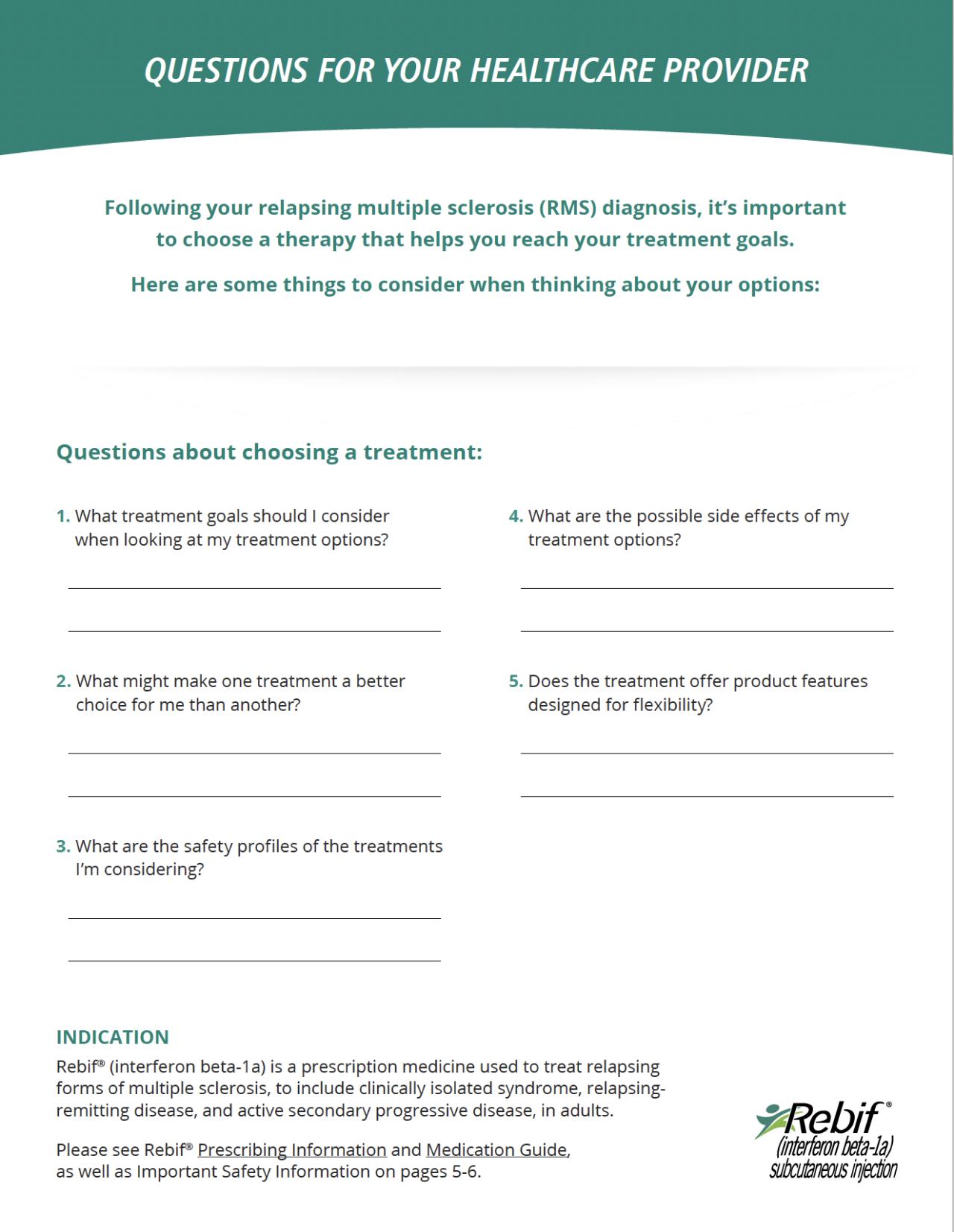VIDEOS & OTHER RESOURCES
Information to support you on your treatment journey
Explore this page for helpful downloads, videos, and other information to support you in managing your relapsing multiple sclerosis (RMS).
RESOURCES
IMPORTANT SAFETY INFORMATION AND INDICATION
Important Safety Information
Do not take Rebif if you are allergic to interferon beta, human albumin, or any of the ingredients in Rebif.
Rebif can cause serious side effects. Tell your healthcare provider right away if you have any of the symptoms listed below while taking Rebif.
- Behavioral health problems including depression and suicidal thoughts. You may have mood problems including depression (feeling hopeless or feeling bad about yourself), and thoughts of hurting yourself or suicide.
- Liver problems or worsening of liver problems including liver failure. Symptoms may include nausea, loss of appetite, tiredness, dark colored urine and pale stools, yellowing of your skin or the white part of your eye, bleeding more easily than normal, confusion, and sleepiness. During your treatment with Rebif you will need to see your healthcare provider regularly and have regular blood tests to check for side effects.
- Serious allergic and skin reactions. Symptoms may include itching, swelling of your face, eyes, lips, tongue or throat, trouble breathing, anxiousness, feeling faint, skin rash, hives, sores in your mouth, or skin blisters and peels.
- Injection site problems. Rebif may cause redness, pain, itching or swelling at the place where your injection was given. Call your healthcare provider right away if an injection site becomes swollen and painful or the area looks infected. You may have a skin infection or an area of severe skin damage (necrosis) requiring treatment by a healthcare provider.
- Blood problems. Rebif can affect your bone marrow and cause low red and white blood cell and platelet counts. In some people, these blood cell counts may fall to dangerously low levels. If your blood cell counts become very low, you can get infections and problems with bleeding and bruising. Your healthcare provider may ask you to have regular blood tests to check for blood problems.
- Pulmonary arterial hypertension. Pulmonary arterial hypertension can occur with interferon beta products, including Rebif. Symptoms may include new or increasing fatigue or shortness of breath. Contact your healthcare provider right away if you develop these symptoms.
- Seizures. Some people have had seizures while taking Rebif.
Before you take Rebif, tell your healthcare provider if you have or have had any of the following conditions:
- mental illness, including depression and suicidal behavior
- liver problems
- bleeding problems or blood clots
- low blood cell counts
- seizures (epilepsy)
- thyroid problems
- drink alcohol
- are pregnant or plan to become pregnant. It is not known if Rebif will harm your unborn baby. Tell your healthcare provider if you become pregnant during your treatment with Rebif
- are breastfeeding or plan to breastfeed. Rebif may pass into your breastmilk. Talk with your healthcare provider about the best way to feed your baby if you take Rebif
Tell your healthcare provider about all medicines you take, including prescription and over-the-counter medicines, vitamins and herbal supplements.
The most common side effects of Rebif include:
- flu-like symptoms. You may have flu-like symptoms when you first start taking Rebif. You may be able to manage these flu-like symptoms by taking over-the-counter pain and fever reducers. For many people, these symptoms lessen or go away over time. Symptoms may include muscle aches, fever, tiredness, and chills
- stomach pain
- change in liver blood tests
Tell your healthcare provider if you have any side effect that bothers you or that does not go away.
These are not all the possible side effects of Rebif. For more information, ask your healthcare provider or pharmacist.
Call your doctor for medical advice about side effects. You may report side effects to FDA at 1-800-FDA-1088 or visit www.fda.gov/medwatch.
Indication
Rebif® (interferon beta-1a) is a prescription medicine used to treat relapsing forms of multiple sclerosis, to include clinically isolated syndrome, relapsing-remitting disease, and active secondary progressive disease, in adults. It is not known if Rebif is safe and effective in children.
Please see Rebif® Prescribing Information and Medication Guide.


